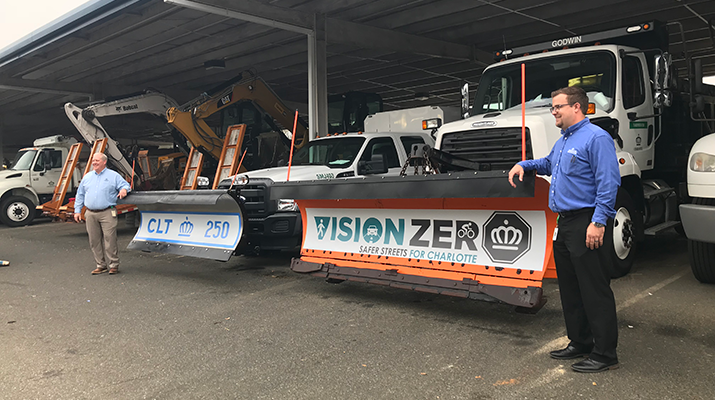Emergency Information

Service Updates
- Solid Waste Services plans to collect all garbage today. In the event they are unable to complete collection, garbage will be collected on a delay late tomorrow morning. Recycling collection is on a one-day delay due to the MLK Holiday and other inclement weather events. Friday recycling customers will be collected late Saturday morning. Residents are encouraged to keep their carts at the curb until they receive service.
- CATS is operating on a normal weekend schedule. CATS will keep trains on the tracks after hours to keep ice from building up. Service will end at normal time, no passengers may ride trains after hours.
Winter weather tips
Specific hazard information - Winter weather advisory
A Winter Weather Advisory is issued when wintry weather is expected. Light amounts of wintry precipitation or patchy blowing snow will cause slick conditions and could affect travel if precautions are not taken. Exercise caution.
Sign up for email and text alerts.
Prepare yourself, your family, and your neighbors:
- To begin preparing, you should build an emergency kit and make a family communications plan.
- Make sure you have a cell phone with an emergency charging option (car, solar, hand crank, etc.) in case of a power failure.
- For those who depend on electricity to operate medical equipment, make alternate arrangements in case of power outage for an extended period of time.
- Plan to check on elderly/disabled relatives and neighbors.
- Plan to bring pets inside.
- Know where the manual release lever of your electric garage door opener is located and how to operate it in case you lose power.
- Fill a gallon container with water and place them in your freezer to help keep food cold.
Prepare your home:
- Make sure your home is well insulated and that you have weather stripping around your doors and window sills to keep warm air inside.
- Make sure you have a working carbon monoxide detector.
- Keep fire extinguishers on hand, and make sure everyone in your house knows how to use them. House fires pose an additional risk during cold weather! More people turn to alternate heating sources without taking the necessary precautions.
- Learn how to shut off water valves in case pipes burst.
Prepare your vehicles:
- Fully winterize your vehicle. Have a mechanic check antifreeze, brakes, heater and defroster, tires, and windshield wipers to ensure they are in good shape. Keep your gas tank at least half full.
- Keep an extra emergency kit specifically created for your car. Include the basic essentials along with a portable cell phone charger, ice scraper, extra blanket, sand for traction, and jumper cables.

Driving in Winter Weather:
If you must travel, the North Carolina Highway Patrol gives the warnings below:
- Reduce your speed. Driving at the regular speed limit will lower your chances to control the car if you begin to slide.
- Leave plenty of room between you and other vehicles.
- Bridges and overpasses collect ice first. Approach them with a lot of caution. Do not push your brakes while on the bridge.
- If you do begin to slide, take your foot off the gas. Turn the steering wheel IN THE DIRECTION OF THE SLIDE. Do NOT push the brakes as that will cause further loss of control of the car.
If you become trapped in your car:
- Pull off the highway. Stay calm and stay inside your vehicle. At night, turn on the inside dome light, so work and rescue crews can see you.
- Set your directional lights to "flashing" and hang a cloth or distress flag from the radio aerial or window.
- In a rural or wilderness area, put a large cloth over the snow to get rescue crews who may be looking at the area by airplane to see you.
- Do not go out on foot unless you can see a building close by where you know you can take shelter.
- If you run the engine to keep warm, open a window a little bit for air. This will keep you safe from possible carbon monoxide poisoning. When you can, clear away snow from the exhaust pipe.
- Exercise to keep body heat, but try not to do too much. In extreme cold, use road maps, seat covers, and floor mats for insulation. Huddle with passengers and use your coat as a blanket.
- Never let everyone in the car sleep at once. One person should stay awake to look for rescue crews.
- Be careful not to use battery power. Balance electrical energy needs - the use of lights, heat, and radio - with your supply.
Cold Related Illness
Frostbite is a serious condition that's caused by exposure to extremely cold temperatures.
Signs include:
- A white or grayish-yellow skin area
- Skin that feels unusually firm or waxy
- Numbness
If you detect symptoms of frostbite, seek medical care.
Hypothermia, or abnormally low body temperature, is a dangerous condition that can occur when a person is exposed to extremely cold temperatures.
Hypothermia is caused by prolonged exposure to very cold temperatures. When exposed to cold temperatures, your body begins to lose heat faster than it's produced. Lengthy exposures will eventually use up your body's stored energy, which leads to lower body temperature.
Warning signs include:
- Adults: shivering, exhaustion, confusion, fumbling hands, memory loss, slurred speech, and drowsiness.
- Infants: bright red, cold skin, very low energy.
If you notice any signs, take the person's temperature. If it is below 95ᵒF, the situation is an emergency - get medical attention immediately.
Twitter accounts
@CharMeckEM
Charlotte-Mecklenburg Emergency Management
@CLTgov
City of Charlotte
@MeckCounty
Mecklenburg County
@NWS
National Weather Service
@NWSGSP
National Weather Service- Greenville/Spartanburg
@NOAA
National Oceanic and Atmospheric Administration
@NCEMergency
NC Emergency Management
@fema
FEMA